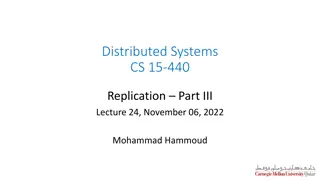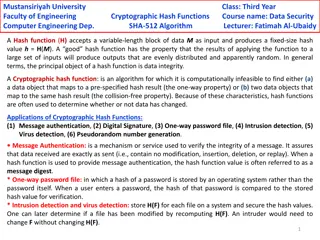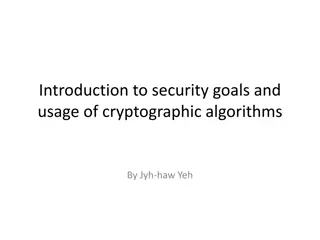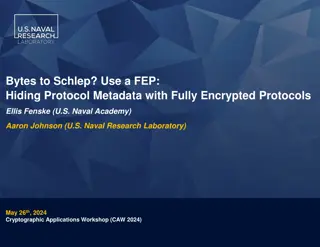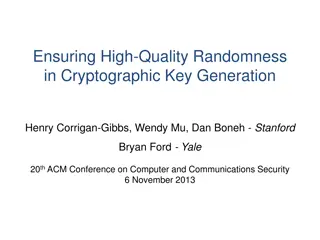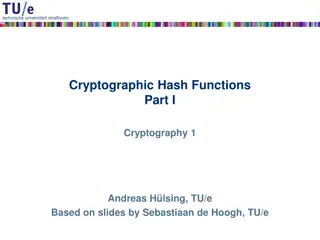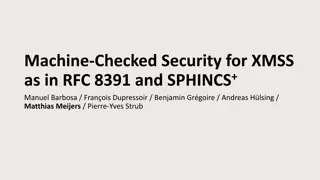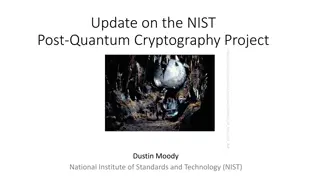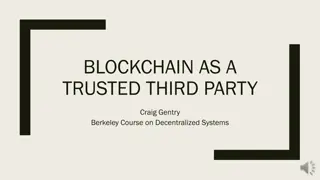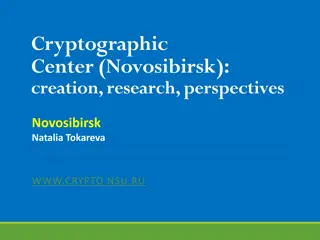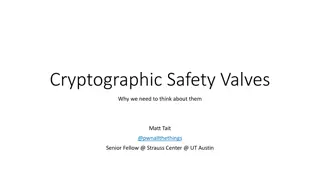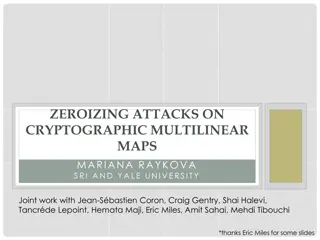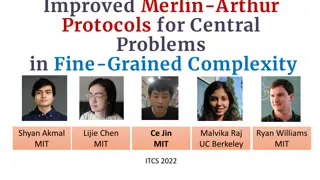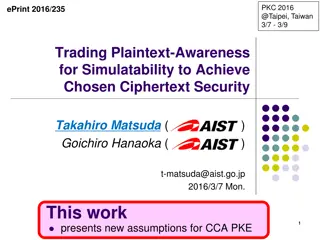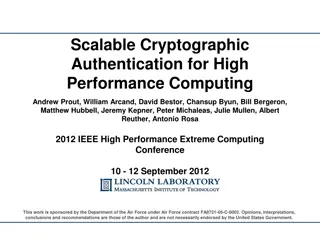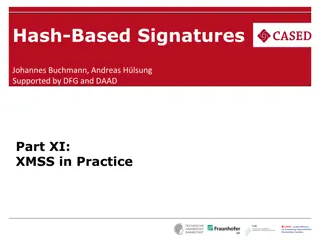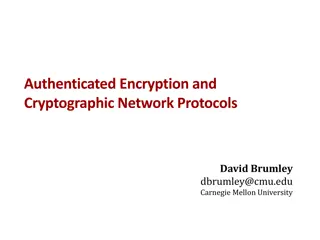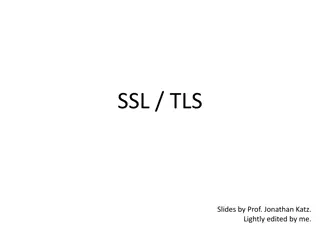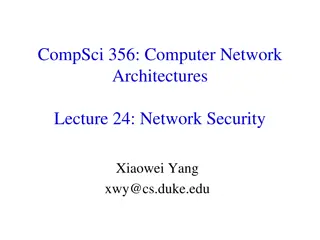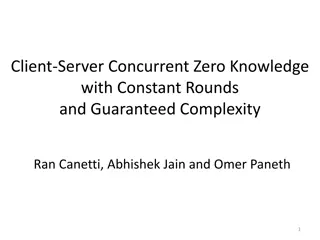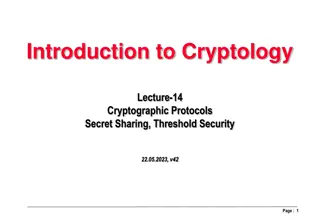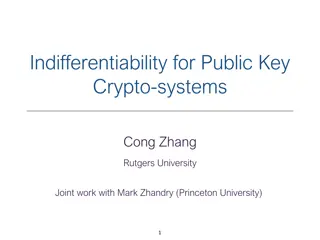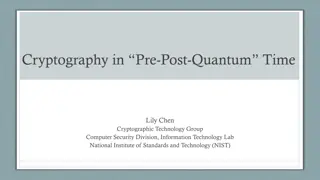Cryptographic Reductions and Learning in Computational Complexity
This lecture explores the connection between computational complexity and cryptography, focusing on topics like pseudorandom functions, public-key cryptography, and learning from Gaussians. It delves into the implications of cryptographic reductions, lower bounds for learning MLPs, and the existence
1 views • 22 slides
Update on SWAG Protocols and New NICE TA Progress Report
Kate Gregory leads the SWAG Protocols update for March 2024, with advancements in new protocols and NICE TA updates. A comparison of activities from Oct 2023 to Mar 2024 shows progress in issuing, reviewing, and drafting protocols. The latest NICE TA additions include treatments for advanced cancers
6 views • 13 slides
Consistency Protocols in Distributed Systems
Today's lecture covers consistency protocols in distributed systems, focusing on primary-based protocols and replicated-write protocols. These protocols play a crucial role in ensuring consistency across multiple replicas. One example discussed is the Remote-Write Protocol, which enforces strict con
2 views • 35 slides
Cryptographic Data Integrity Algorithms
Cryptographic data integrity algorithms ensure data integrity, verifying data received matches what was sent by authorized entities. Cryptographic hash functions play a crucial role in ensuring data integrity through hash values. Applications include message authentication, digital signatures, and v
4 views • 41 slides
Cryptographic Hash Functions in Data Security: Mustansiriyah University Course Overview
Cryptographic hash functions play a crucial role in ensuring data integrity and security. This course at Mustansiriyah University's Faculty of Engineering covers the SHA-512 algorithm and its applications in various fields such as message authentication, digital signatures, and intrusion detection.
0 views • 6 slides
Security Goals and Cryptographic Algorithms
Introduction to security goals such as privacy, data integrity, authentication, authorization, and availability, along with the usage of cryptographic algorithms like symmetric and asymmetric key algorithms, keyed hashing, and digital signatures for achieving different security objectives in communi
0 views • 13 slides
Securing Protocols with Fully Encrypted Protocols (FEPs)
In this research presented at the Cryptographic Applications Workshop, Ellis Fenske and Aaron Johnson address the challenges of Fully Encrypted Protocols (FEPs). They highlight the lack of precise understanding, formalized goals, and proven security in existing FEPs. The work introduces new security
0 views • 29 slides
Enhancing Cryptographic Key Generation with High-Quality Randomness
This presentation discusses the critical aspect of ensuring high-quality randomness in cryptographic key generation processes. It explores key vulnerabilities and common failure modes, emphasizing the importance of incorporating strong randomness. The content delves into various methods and issues r
0 views • 45 slides
Cryptographic Hash Functions
Cryptographic hash functions play a crucial role in various aspects of security, including integrity protection, checksum generation, password hashing, digital signatures, and more. They are designed to efficiently convert input data of arbitrary length into fixed-length output, aiding in tasks like
0 views • 32 slides
Enhancing Security for XMSS and SPHINCS+ Using Machine-Checked Methods
Advanced cryptographic techniques such as XMSS and SPHINCS+ are critical for ensuring secure digital signatures in a post-quantum world. This project focuses on improving the security and verification processes of XMSS and SPHINCS+ using machine-checked methods, aiming to enhance trust in these cruc
1 views • 17 slides
Cryptographic Algorithms and Hash Collisions Overview
Explore the world of cryptographic algorithms and hash collisions. Learn about various hashing algorithms like MD5, SHA-1, SHA-256, and more. Dive into the concepts of symmetric and asymmetric key algorithms and understand the risks associated with hash collisions. Discover the implications of post-
0 views • 58 slides
Franco-Japanese Cybersecurity Workshop Highlights and Future Plans
The 5th Franco-Japanese Cybersecurity Workshop concluded with insightful discussions on key areas such as IoT security, AI, hardware security, and supply chain security. The steering committee members shared plans for the 6th workshop in France, emphasizing policy discussions and cross-cutting issue
0 views • 18 slides
Quantum Computing and Its Impact on Cryptography
Quantum computing utilizes the principles of quantum mechanics to process information exponentially faster than classical computers. This advancement poses a significant threat to current cryptographic systems, especially those reliant on factors like RSA and Diffie-Hellman key exchange. If large-sc
0 views • 25 slides
Exploring the Role of Blockchain as a Trusted Third Party in Decentralized Systems
Blockchain technology serves as a decentralized and cryptographic Trusted Third Party (TTP) by enhancing trust, immutability, and censorship resistance in transactions. By distributing trust and utilizing cryptographic protocols, blockchain mitigates the need for a centralized authority, offering a
0 views • 30 slides
Cryptographic Center in Novosibirsk: Advancements in Cryptography and Research
The Cryptographic Center in Novosibirsk, established in 2011, focuses on advancing cryptography through research, education, and international collaborations. With a team of researchers and students, the center explores various aspects of cryptography, including cryptographic Boolean functions, ciph
0 views • 33 slides
Faster Implementation of Modular Exponentiation in JavaScript
Development of a cryptographic authentication toolkit for web application developers. Discusses modular exponentiation, digital signatures, elliptic curve cryptography, and the importance of DSA in providing secure authentication. Aims to offer both classical and elliptic curve cryptographic solutio
0 views • 22 slides
The Importance of Cryptographic Safety Valves in Legislation
Legislation regarding cryptographic safety valves is impending, with potential implications on privacy and security. Matt Tait discusses the need to analyze risks and consequences, emphasizing the importance of transparent and secure safety valves. The debate surrounds decryption requirements for da
0 views • 17 slides
Zeroizing Attacks on Cryptographic Multilinear Maps: Overview and Applications
Cryptographic multilinear maps (MMAPs) enable computations on encoded secret data, offering similarities to fully homomorphic encryption (FHE) while providing distinct features. MMAPs find applications in identity-based encryption, non-interactive zero-knowledge proofs, and more. The evolution of MM
0 views • 45 slides
Cryptographic Protocols and Key Exchange
This content delves into the world of cryptographic protocols, discussing the importance of security measures such as symmetric cryptography, hash functions, and public-key cryptography. It explores the field's various studies, goals, Diffie-Hellman key exchange, and the significance of key size in
1 views • 28 slides
Improved Merlin-Arthur Protocols for Fine-Grained Complexity Problems
The text discusses Merlin-Arthur proof systems and protocols for central problems in fine-grained complexity, particularly focusing on the time complexity, completeness, and soundness of these protocols. It also touches on recent interest in these protocols and presents new results in areas such as
0 views • 16 slides
New Assumptions for Achieving Chosen Ciphertext Security in Cryptography
This research work focuses on presenting new assumptions for achieving chosen ciphertext security in public key encryption. The study aims to clarify the necessary and sufficient assumptions to realize general cryptographic primitives, particularly focusing on CCA secure PKE and KEM. The ultimate go
0 views • 27 slides
Scalable Cryptographic Authentication for High Performance Computing
This work discusses the scalable cryptographic authentication approach developed by Andrew Prout and team for high-performance computing. The LLGrid system architecture, challenges with interactive supercomputing, and utilization of LLGrid for various computing tasks are explored, highlighting the i
0 views • 34 slides
Cryptographic Hashing and its Importance
Cryptographic hashing involves converting data into fixed-size values for secure storage and verification purposes. It plays a vital role in data security, ensuring integrity and confidentiality. This article explores hashing algorithms, applications, collisions, and the best practices for storing s
0 views • 24 slides
Hash-Based Signatures
This comprehensive guide delves into the practical applications of hash-based signatures, exploring implementations with XMSS, AES, SHA-2, and other cryptographic algorithms. The content covers XMSS implementations in C, smartcard setups, PRF and hash functions from AES and SHA-2, as well as compari
0 views • 8 slides
MIT Foundations of Cryptography Lecture 22
In lecture 22 of MIT's Foundations of Cryptography series, delve into advanced cryptographic concepts and techniques. From modern encryption algorithms to cryptographic protocols, this lecture offers profound insights to enhance your cryptographic knowledge and understanding. Explore cutting-edge to
0 views • 46 slides
Bit Coins And Anonymity
Bitcoin provides a level of anonymity through its decentralized nature, allowing users to transact without the need for traditional banking methods. However, it does not offer complete anonymity. Cryptographic hash functions play a crucial role in securing Bitcoin transactions by ensuring data integ
0 views • 22 slides
Security: An Overview of Cryptographic Techniques
Delve into the realm of cryptography with a comprehensive overview of techniques and protocols for ensuring secure communication channels. Explore the concepts of authentication, confidentiality, integrity, and availability. Uncover the tools and methodologies used in building cryptographic schemes
0 views • 26 slides
Basic Cryptography
Cryptography is a mathematical method used to protect information in modern computing. This course covers cryptographic primitives such as hash functions, symmetric and asymmetric encryption, digital signatures, and their applications. Learn about the importance of cryptographic hash functions, usin
0 views • 19 slides
Secure Hashing, Digital Signatures, and Secret Sharing Principles
This presentation covers essential concepts of secure hashing, digital signatures, and secret sharing in information security. It discusses the motivation behind using hash functions, properties they must satisfy, examples like HMAC, and the importance of cryptographic hash functions. The content ex
0 views • 46 slides
TLS Protocol Basics: Standard Cryptographic Protocol for Secure Transmissions
Transport Layer Security (TLS) is a standard cryptographic protocol used for secure transmissions over networks. It provides encryption and server identity authentication, ensuring data privacy and integrity. TLS supports various algorithms like RSA, DSA, EC, and encryption methods like RC4, DES, AE
0 views • 58 slides
Cryptographic Signatures: Hash, RSA, and ECDSA Explained
In this content, the concepts of cryptographic signatures are explored, covering topics such as the hash and sign paradigm, the vulnerabilities of plain RSA signatures, RSA-FDH, and ECDSA (used in Bitcoin). The content delves into signature schemes, security definitions, threat models, and formal de
0 views • 38 slides
Cryptographic Complexity of the Worst Functions Unveiled
Delve into the cryptographic complexity of the worst functions with expert insights from Amos Beimel, Yuval Ishai, Ranjit Kumaresan, and Eyal Kushilevitz. Explore the models, security considerations, and advancements in secure computation within information-theoretic frameworks. Understand the chall
0 views • 46 slides
Understanding Authenticated Encryption and Cryptographic Protocols
Delve into the world of authenticated encryption, cryptographic network protocols, and security vulnerabilities such as tampering attacks. Learn about encryption methods like CBC with random IV, examples of attacks, and the importance of integrity and confidentiality in cybersecurity.
0 views • 38 slides
Understanding LAN MAC Protocols for Data Communications
Explore the world of LAN MAC protocols, which are essential sets of rules governing data communications. Learn about syntax, semantics, and timing within protocols, and delve into fixed assignment protocols and frequency-division multiple access. Discover how these protocols ensure effective communi
0 views • 21 slides
Understanding SSL/TLS Protocols and Handshake Process
Explore the evolution of SSL/TLS protocols, the goals of these cryptographic protocols, the two-phase handshake process to establish secure communication, and the record-layer protocol for encryption and authentication. Discover how SSL/TLS ensures secure transmission of sensitive information like c
1 views • 6 slides
Understanding Network Security Fundamentals: Cryptography, Protocols, and Tools
Dive into the essentials of network security with a focus on cryptography, security protocols, and tools. Learn about the importance of confidentiality, integrity, authenticity, and availability, and explore how cryptographic building blocks and non-cryptographic approaches help address security thr
0 views • 56 slides
Zero-Knowledge Protocols and Concurrent Composition in Cryptography
Explore the world of zero-knowledge protocols and concurrent composition in cryptography, including concepts like completeness, soundness, and the significance of zero-knowledge in larger cryptographic systems. Discover how modern protocols have evolved from standard assumptions to ensure security i
0 views • 32 slides
Cryptographic Protocols and Secret Sharing in Cryptology
Learn about cryptographic protocols like Shamir 3-Pass Protocol, secret sharing techniques, and threshold security schemes in the field of cryptology. Explore concepts such as no-key security protocols, Shamir's Threshold Scheme, and the use of encryption techniques like Vernam One-Time Pad Lock and
0 views • 22 slides
Idealized Model for Cryptographic Primitives and Indifferentiability Framework
Explore new notions and constructions in public key crypto-systems, leakage resilience, related-key attack PKE, and idealized models for cryptographic primitives such as hash functions, random oracles, and more. Learn about the concept of Ideal NIKE and the Indifferentiability Framework in the conte
0 views • 20 slides
NIST Cryptographic Standards Update and Project Progress
Learn about the progress and updates on the NIST Cryptographic Standards project, including the status of submissions, first-round candidates, and standardization guidelines for post-quantum cryptographic technology. Stay informed on the latest developments in cryptography from NIST.
0 views • 13 slides


